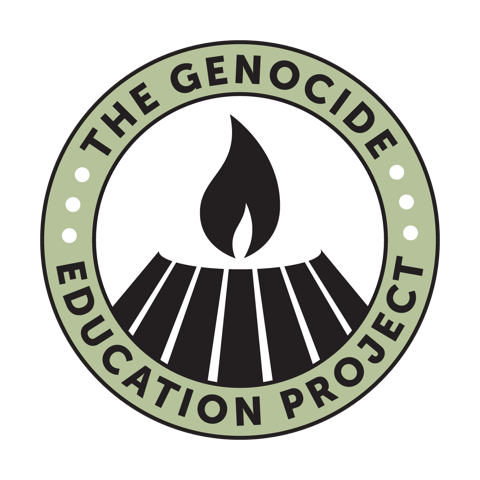San Francisco, March 23, 2014 – The Genocide Education Project (GenEd) presented a three-hour workshop about the experience of Armenian Genocide orphans for approximately 40 high school students from all over the Bay Area. The students were among more than 700 youth and educators from more than 100 schools participating in the “Day of Learning,” a program of the Holocaust Center of the Jewish Family Children’s Services in San Francisco.
The program’s theme, “Voices of Youth,” was intended to inspire students to look at the Holocaust and patterns of genocide through the eyes of individuals their age. Sara Cohan, Education Director for The Genocide Education Project presented the interactive workshop focusing on the fate of more than 200,000 Armenian Genocide orphans.
“I thought that the workshop was very interesting and I wish we had more time to spend! It was incredibly informative, beautifully worded, and I’ve taken a great interest in the Armenian Genocide now, not only for our project, but also from pure personal interest,” said Leeshia Rocha of Moreau High School in Hayward, CA. “The speakers/hostesses were lovely and the presentation was perfect and answered all the questions I had. I hope the Armenian Genocide gains more awareness because I truly believe it is worth learning about!”
After a brief history of the Armenian Genocide, students learned how orphans mostly died along deportation routes, or were taken by Turks or Kurds, or put in orphanages run by Americans, Europeans, or “Turkification” centers run by Turks to transform them into Turks.
“It was gratifying to see how engaged the students were in the stories of the Armenian Genocide orpha
ns,” said Cohan. “Their questions were so insightful and the carried out their workshop assignments with interest and imagination.”
Students heard from Sa n Francisco Armenian-American community member, Mihran Misserlian, who told students his grandmother’s survival story: Ovsanna Misserlian was 3 years old when she, her mother, and her older sister were forced to leave their home in Izmit,Turkey. Ovsanna’s mother did not survive the death march, and her sister sought to protect her by placing her in an Arab home until she could retrieve her. Ovanna’s sister never returned, and eventually French troops found Ovsanna and placed her in an orphanage in Aleppo, Syria. She was leter placed in the Armenian home of the Misserlian family as a housekeeper, and she married the family’s older son, Mihran Misserlian.
n Francisco Armenian-American community member, Mihran Misserlian, who told students his grandmother’s survival story: Ovsanna Misserlian was 3 years old when she, her mother, and her older sister were forced to leave their home in Izmit,Turkey. Ovsanna’s mother did not survive the death march, and her sister sought to protect her by placing her in an Arab home until she could retrieve her. Ovanna’s sister never returned, and eventually French troops found Ovsanna and placed her in an orphanage in Aleppo, Syria. She was leter placed in the Armenian home of the Misserlian family as a housekeeper, and she married the family’s older son, Mihran Misserlian.
Students also watched a video interview of 101-year old Armenian Genocide orphan survivor, Almas Avakian, from the documentary film, “Orphans of the Genocide,” produced by Bared Maronian. GenEd board member, Roxanne Makasdjian, and Sara Cohan told the stories of their grandparents’ escape from the Armenian Genocide.
The workshop included a section about the problem of continuing denial of the Armenian Genocide and the current controversy over the White House’s “Orphan Rug,” handmade in the 1920s by Armenian orphans as a gift to the United States. During an activity session at the end of the workshop, students broke up into groups to devise some kind of action they would take to express or respond to what they had learned.
The workshop included a section about the problem of continuing denial of the Armenian Genocide.
In addition to attending individual workshops, students attending the Day of Learning gathered to hear testimony from a Rwandan genocide survivor and watch a short film about the experience of a Jewish family in Poland during the Holocaust.
Educators interested in obtaining instructional materials about the orphans of the Armenian Genocide are welcome to contact The Genocide Education Project at info@GenocideEducation.org.
